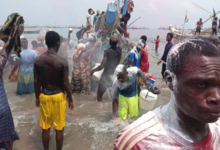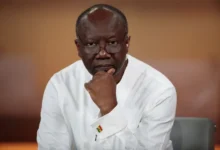
The Economic Community of West African States (ECOWAS) last Friday announced its readiness to use the military option to restore constitutional rule in Niger if other options failed.
Briefing journalists in Accra after a two-day meeting of Chiefs of Defence Staff (CDSs) from nine countries in the Community, the Commissioner of Political Affairs, Peace and Security at the ECOWAS, Dr Abdel-Fatau Musah, said if diplomacy with the junta in Niger over the weekend went successful, the military option would be aborted.
According to him, ECOWAS has extended enough diplomatic courtesies to the junta and that “All options are on the table. The sanctions are also on the table. All we are saying is that we are not going to engage in endless dialogue.”
He said the military option was not the preferred option but could follow the intransigence of the junta.
Dr Musah said ECOWAS was worried about the reemergence of coups in the region and so would use Niger to “put a stop to it. We are drawing the line in the sand that enough is enough”.
The Commissioner said the strategic list capacity, equipment and any other things needed, including the scheduled time, were ready for the deployment of the ECOWAS standby force in Niger.
Dr Musah, however, said the final decision rested with “our heads of states and governments” after being satisfied with a report to be presented.
He explained that if the military option became necessary, the operation would be “surgical and short-lived” to ensure that a humanitarian crisis was not created to worsen the situation.
Signatories to the plan were the CDSs of Ghana, Nigeria, Togo, Benin, Côte d’Ivoire, Liberia, Sierra Leone, The Gambia and Senegal.
Meanwhile the United Nations (UN) has expressed fears that the sanctions imposed on Niger by ECOWAS following the coup there could affect humanitarian efforts in an already-troubled area.
The sanctions include the closure of air and land borders.
In the circumstances, the Under-Secretary-General for Humanitarian Affairs and Emergency Relief Coordinator at the UN, Martin Griffiths, has sent a letter to the President of the ECOWAS Commission appealing to the regional bloc to ensure that the sanctions do not worsen humanitarian crisis in the Niger.
He implored the ECOWAS to ensure the safe, timely and unimpeded movement of humanitarian cargo and personnel into and out of Niger, by air and by land.
“Clarify that all commercial and financial transactions necessary to support the continuation of humanitarian operations in Niger remain permitted…,” the letter states.
The UN also wants ECOWAS to maintain the provision of utility services as necessary to support humanitarian operations.
“Exclude from asset freezes all transactions needed to support the delivery of humanitarian assistance and activities, including the processing or payment of funds, other financial assets, or economic resources,” it said.
The letter added that “Ensure that humanitarian organisations and their personnel involved in such transactions do not incur any legal risk for their activities strictly related to the provision of humanitarian assistance to the population of Niger.”
BY JULIUS YAO PETETSI







